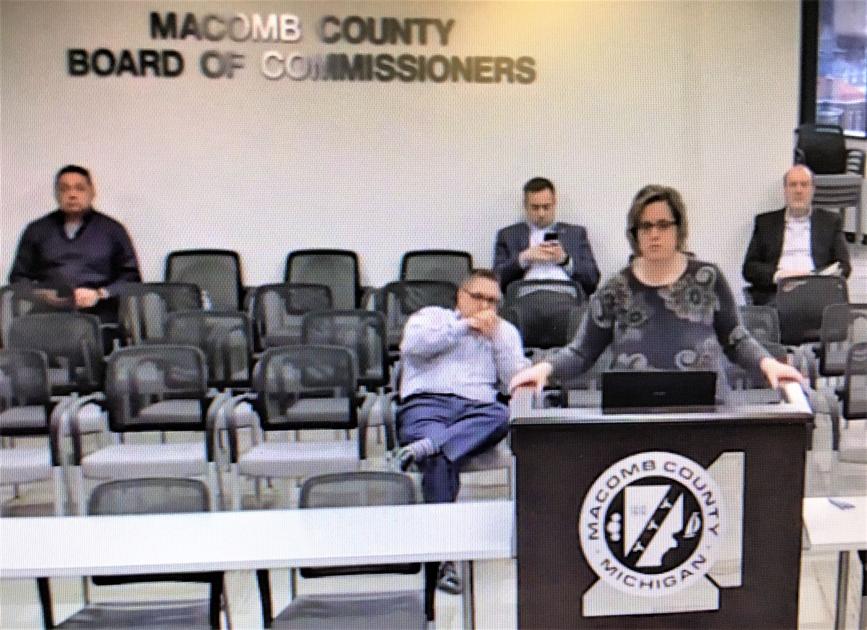A top Macomb County official is concerned the county could lose a large chunk of its critical staff due to the spread of COVID-19.
Deputy County Excecutive Vicki Wolber, the former Emergency Management director, told county commissioners at a board meeting last week that pandemic plans show the county the county could lose one-third or more of its staff in the coming weeks and months.
As of Friday, no county employee has tested positive for COVID-19, although eight people from the county Prosecutor’s Office are under self-quarantine due to potential exposure.
“You’re going to start to have personal affected, and that is the scary part,” she told the Board of Commissioners on Wednesday. “You’re going to start to see staff that is not available.”
“We plan on losing 30 to 40 percent of our personnel for one reason or another,” she said of pandemic-scenario plans. “That’s going to be coming potentially in the next few weeks or months. That is really going to start to hurt us.”
The county provides a wide array of services, including police protection, health and nutrition assistance, court and jail operations, road maintenance, and record-keeping, among others.
While employees can be shifted from one department to another to fill gaps, many public-safety jobs require specialized skills that only a limited number of people possess, she said. She mentioned police officers, firefighters, paramedics, dispatchers and health-care workers.
“Some process is going to have to be looked at for police, fire, EMS, health-care workers,” she said.
Dispatchers in the county have already developed a plan to deal with a shrinking staff by consolidated into two sites, she said.
The county’s Meals on Wheels program, offered through Macomb Community Action, typically uses dozens of volunteer drivers. But due to the virus, that function already has been switched to county employees.
Wolber said she also is concerned about a “greater need for senior citizens getting out to stores.”
“We are going to address that,” she said.
The county also has been assisting schools in feeding students eligible for free meals.
Wolber noted if local hospitals become full, county facilities may have to be used as makeshift care facilities.
“If we get beyond our surge capability, which is likely, you will see other buildings used for hospital care,” she said. “We have to start looking at executing that,” such as looking at staffing and feeding issues.
Of health systems, she said, “They’re doing everything they can do to add extra space in their hospitals.”
At the meeting, the board approved a 30-day extension of an emergency declaration first passed March 13. It provides the County Executive staff with increased authority to spend money, enter into contracts, buy and distribute supplies, material and equipment in connection with the crisis.
The meeting was the first-ever board meeting held remotely; it was in compliance with the Open Meetings Act using the video conference technology meet.google.com.
Wolber asked for a 90-day extension, but commissioners approved the shorter time with the intent to extend it multiple times as necessary. The board already has a meeting scheduled for April 14.
Commissioner Leon Drolet, D-Macomb Township, said the shorter period is needed “so I, as a commissioner, can check back in, staying engaged to know what is being spent and be there. It’s a check-in point for the Board of Commissioners.”
Upon questioning from other commissioners, Wolber said county officials are keeping track of all COVID-19-related expenditures for possible later reimbursement by the state and/or federal government.
She said the county has spent very little on materials or supplies but has devoted a fair amount of employee time to COVID-19 response, including overtime in the Health Department, Emergency Management and Planning and Economic Development, among others.
She noted the coronavirus may be a long-term issue. The number of cases could decrease substantially in a few months but increase against next fall or next year.
After the emergency declaration is lifted, the county likely will need a month-long transition period to resume normal operations, she said.
Wolber said the crisis is unprecedented and has impacted her emotionally.
“This is really one of those worst-case scenarios,” she said. “We’ve never had a public health emergency to this extent. Because it is spread person to person, that is why there is such great concern.
“This is the hardest week I’ve had, one of the most emotional events. A lot of that is due to the time and effort put into it.
“These are extraordinary times. We can’t forget being there for one another and being supportive.”


